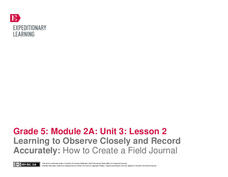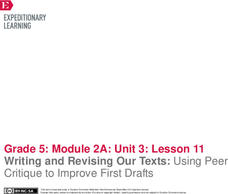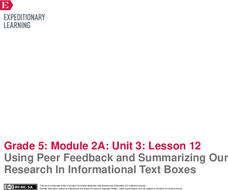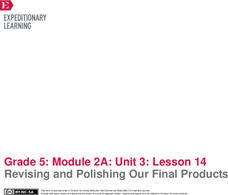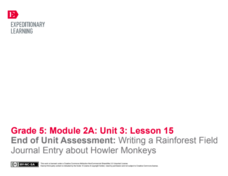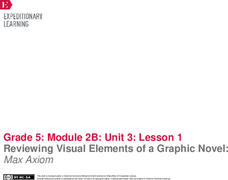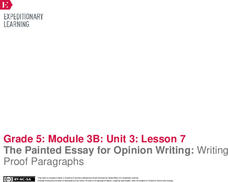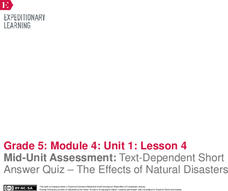EngageNY
How to Write Like a Scientist in the Field: Introduction to the Elements of Field Journals
It's time to start journaling. Scholars look at examples of science field journals. They work in pairs to examine and complete a note catcher about a field journal. They then add to an anchor chart by discussing the different features...
EngageNY
Learning to Observe Closely and Record Accurately: How to Create a Field Journal
Look carefully. Scholars practice observing and recording the natural world around them by looking out a window or viewing an image. Learners discuss how their experience compares to that of Meg Lowman in The Most
Beautiful Roof in the...
EngageNY
Conducting Research: Analyzing a Variety of Sources to Capture Information about My Insect
From picture to words. Scholars analyze a picture of an ant and then list two facts they observed and any questions that may arise. Expert groups from the previous instructional activity then look at a diagram about either an ant or...
EngageNY
Writing and Revising Our Texts: Using Peer Critique to Improve First Drafts
Mail me a postcard. Individuals design a postcard to show what Meg Lowman from The Most Beautiful Roof in the
World might have written to her friends at home. They then continue to work on writing a science journal entry.
EngageNY
Using Peer Feedback and Summarizing Our Research In Informational Text Boxes
Insert text box here. Learners use index cards to create their own informational text boxes. The text box includes information about an insect in the rainforest. Scholars also complete the draft of their research science journal entries.
EngageNY
Revision and Illustration: Strengthening the Writing in my Rainforest Field Journal and Adding a Labeled Drawing
Let me draw you a picture. Scholars read a quote from Roger Tory Peterson and discuss his views on drawings. They then create their own drawings of an ant or butterfly to add to their science journals.
EngageNY
Revising and Polishing Our Final Products
One, two, three go! Scholars work independently to finalize the three components of their final task. They complete a science journal entry, scientific text box, and scientific drawing. While working, learners sign up for an...
EngageNY
End of Unit Assessment: Writing a Rainforest Field Journal Entry about Howler Monkeys
Give me more details. Scholars complete an end of unit assessment by creating an information text box to go with their field journal entries about howler monkeys. Learners use the class time to work independently.
EngageNY
Reviewing Visual Elements of a Graphic Novel: Max Axiom
Pass the tea! Using the resource, scholars participate in a Tea Party protocol to analyze text and images about inventions that helped meet societal demands. After sharing their observations with each other, they discuss visual elements...
EngageNY
Peer Critique and Revision: Storyboard, Sections 1-4
Teamwork makes the dream work. Pupils participate in a peer critique process, using forms to offer constructive advice about each other's storyboards. Next, scholars revise their storyboards based on the feedback, and then share their...
EngageNY
Storyboard Revision: Managing the Sequence of Events and Using Sensory Details
Mastering techniques from the resource, pupils give life to their writing, revising their storyboards to include sensory details and transitions. To finish, they participate in a peer critique process and use the feedback to further...
EngageNY
Author’s Read: Final Performance Task
Scholars submit their final performance task, a letter to a publisher about an athlete's legacy. As a culminating activity, they share their work with classmates in small groups.
EngageNY
Building Background Knowledge: Competing Views Regarding Mining on Inuit Lands
Scholars build background knowledge about mining on Inuit lands. Working in small groups, they sort information about the Inuit onto a point of view chart to determine if mining is beneficial to Inuit communities.
EngageNY
The Painted Essay for Opinion Writing: Writing Proof Paragraphs
It's time to proof read! Pupils read and analyze proof paragraphs from a model essay. They then practice writing their own proof paragraphs to express an opinion about offshore oil drilling.
EngageNY
Peer Critique and Revision: Editorial Essay
Get those red pens ready! Using the Peer Critique protocol, scholars provide and receive feedback on their editorial essay drafts. They then use class time to work on revisions.
EngageNY
Group Discussions and Revision: Editorial Essay
Great minds think aloud! Pupils participate in the Fishbowl protocol, discussing their opinions about the Mary River mine proposal. As they share their thoughts, peers provide feedback about their thesis and supporting ideas.
EngageNY
Relationships Between Key Scientific Concepts: Planning What Causes Earthquakes
That is ground shaking news! Scholars read Earthquake in multiple reads to determine the gist, identify cause and effect relationships, and understand vocabulary. Learners complete graphic organizers to describe what happens before and...
EngageNY
Relationships Between Key Scientific Concepts: What Causes Hurricanes?
A storm is brewing in the sea. Scholars complete multiple reads of How Does a Hurricane Form to determine gist, cause-and-effect relationships, and deepen vocabulary understanding. To finish, they complete graphic organizers...
EngageNY
Mid-Unit Assessment: Text-Dependent Short-Answer Quiz—The Effects of Natural Disasters
Readers complete a mid-unit assessment by reading the text How Do Hurricanes Form? They answer text-dependent questions about hurricanes with short answer and sequencing. Learners then participate in a read aloud and text chunking...
EngageNY
Organizing Evidence from Multiple Informational Texts to Prepare for Writing: What Makes an Earthquake a Natural Disaster?
Fifth graders prepare for their end of the unit essay assessment by continuing to look at what makes an earthquake a natural disaster. They complete a graphic organizer and write a topic sentence. To finish, they view a model essay and...
EngageNY
Analyzing Images and Language: Inferring about the Natural Disaster in Eight Days
Pictures often reveal different meanings. Scholars analyze the images in Eight Days and discuss how they add meaning to the text. Readers answers questions about how specific colors are used to create different emotions. Learners then...
EngageNY
End of Unit Assessment: Perspectives on Natural Disasters
Caption this! Scholars complete the end of unit assessment by rereading In the Middle of the
Storm. Learners answer written response questions about the text, and then create drawings to accompany their work. To finish, they caption...
EngageNY
Researching about the Red Cross: What Is a Multinational Aid Organization?
Lend a helping hand. Pupils read two informational articles about international aid organizations and how they help areas affected by natural disasters. Scholars attempt to uncover the gist of each text, discussing their thoughts in...
EngageNY
Researching about the Red Cross, Continued: How Did the Red Cross Aid Haiti After the 2010 Earthquake?
What a puzzle! Scholars participate in a Jigsaw discussion within their expert groups, determining the gist of an article about the 2010 Haiti earthquake. As they read and discuss the article, they record thoughts on their note...

